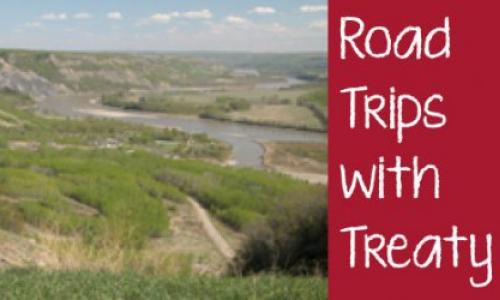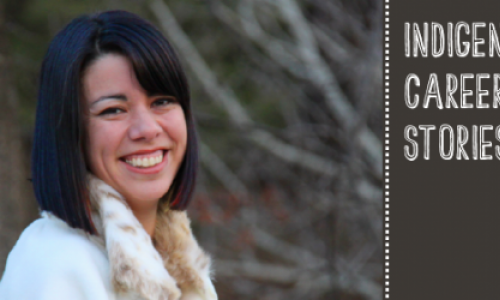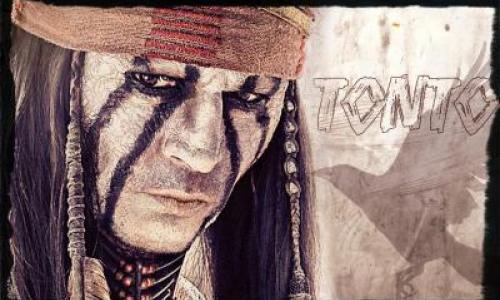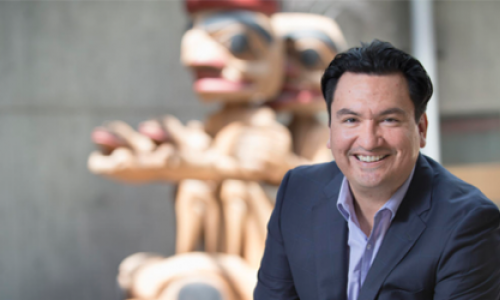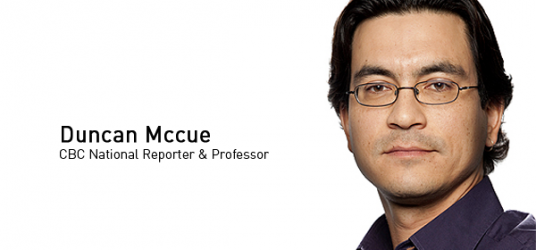
Duncan McCue has been a reporter for CBC News in Vancouver for 12 years. His award-winning news and current affairs pieces are featured on CBC's flagship news show, CBC News The National.
McCue's recent honours include a Jack Webster Award for Best Feature, and he was awarded a Knight Fellowship at Stanford University for 2010-2011. Prior to that, he was awarded a network RTNDA Award for Best Long Feature, and his second regional RTNDA Diversity Award for his coverage of aboriginal issues.
He is also an adjunct professor at the UBC School of Journalism, and has taught journalism to indigenous students at First Nations University and Capilano College. Before becoming a journalist, Duncan studied English at the University of King's College, then law at UBC. He was called to the bar in British Columbia in 1998. Duncan is Anishinaabe, a member of the Chippewas of Georgina Island First Nation in southern Ontario. He lives with his wife and two children in Vancouver.
How is it, I sometimes wonder, that I wound up a journalist? No question, from a young age, I had a compulsion to write. That flame was fueled by my first byline in a student newspaper. But, I can also trace it to one quote, which I read as a young man. It still guides me today when I grapple with difficult or controversial stories.
“Before the healing can begin, the poison must first be exposed.”
It’s the epigraph to the play Dry Lips Oughta Move to Kapuskasing. Cree playwright Tomson Highway attributes the quote to an elder, and it’s probably based on traditional knowledge, that rashes caused by plants such as poison oak or poison ivy cannot be treated without removing the oil causing the irritation. But, clearly, Highway was after something more with that quote. It’s a disclaimer of sorts, for theatre audiences to be aware that Dry Lips contains some dark material --- alcoholism, sexual abuse and self-loathing --- that Highway attributes directly to European colonialism and the role of the Church.
That epigraph spoke to me, as a nineteen-year old of Anishinaabe heritage. It told me that I could, and should, expose the sickness that plagues Canada after a century of ignoring the many facets of aboriginal experience. And it empowered me to confront the darkness that I’ve witnessed in our own communities – substance abuse, corruption, and prejudice.
So, my journey to “expose poison” began with a 500-word rant about systemic racism, in my university newspaper, a paper I’d later run as publisher. My passion for justice lead me to law school, and ultimately, to the Canadian Broadcasting Corporation (CBC), where I’ve been a television news reporter for fourteen years (and counting).
As a current affairs reporter for CBC’s flagship news show The National, I’ve filed more than 500 stories over the past decade, covering a wide range of topics. The economy and politics, the environment or social justice, human interest to investigative. While some reporters measure careers by coverage of the big stories of the day, I’ve always preferred to explore the road less taken. In particular, I’ve tried consistently to bring stories about life in aboriginal communities to a mainstream Canadian audience. I don’t work the “native beat” per se, but I’m sometimes tagged the “native reporter.”
I’ve made a point of telling native stories because other people have been telling our stories for too long. You name it --- missionaries, archaeologists, authors, explorers, historians --- it’s through their eyes that Canadians have learned about Indians, and, unfortunately, they often get it wrong. It’s time native storytellers tell our own stories. “The truth about stories,” says author Thomas King, “is sometimes that is all we are.”
Why have I chosen TV journalism? I like the immediacy of news. I like meeting real people – as the saying goes, truth is stranger than fiction. I need the pressure of deadlines. Every interview has the potential to be a surprising journey. Every story structure is an endless array of possibilities. I strive to afflict the comfortable. I do my best to get it right.
With cameras, I’ve captured scenes which remain vivid in my memory today. The tearful recounting by a teenage prostitute of what its like to be raped by a provincial court judge. My confrontational interview on the street with a suspected eagle poacher. A heartbreaking eruption – and subsequent expulsion – of a high-school student accused of smoking pot during school hours, after we’d spent months following his progress in Grade 10. The noble death in a hospice of an autistic man with a remarkable grasp for classical music.
I’ve also witnessed remarkable triumphs. Dozens of pounding drums on a beach, heralding the arrival of war canoes and a tall-ship on a reconciliation voyage. A championship boxer-turned-inmate raising his fist, after turning his life around and becoming the champ again. The quiet prayer of a man, who, after years of alcohol abuse, now runs a sweat lodge.
These moments still raise the hairs on the back of my neck. They’re “lean-forward” moments --- the ones that make television viewers sit up and watch and listen and perhaps, really understand or at least empathize with a person or an issue. These are the moments I strive for, because I know the media can promote discussion, and even cause change.
Some days are better than others. Every day is a challenge. But I've never regretted becoming a journalist, and I give thanks to the many teachers I've had along the way, and, of course, the many people who let me into their lives to share their stories.










